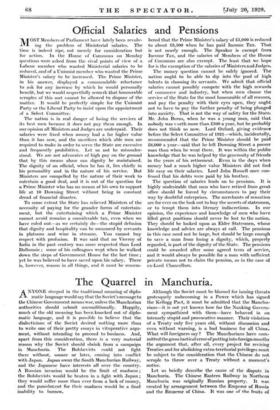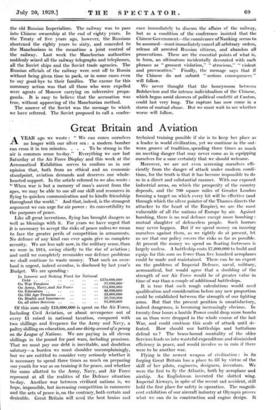The Quarrel in Manchuria.
NYONE steeped in the traditional meaning of diplo- LX matic language would say that the Soviet's message to the Chinese Government means war, unless the Manchurian authorities should submit unconditionally. Happily, much of the old meaning has been knocked out of diplo- matic language, and it is possible to believe that the dialecticians of the Soviet desired nothing more than to write one of their pretty essays in vituperative argu- ment, without intending to proceed to business. And, apart from this consideration, there is a very material reason why the Soviet should shrink from a campaign in Manchuria. The Bolshevists could not fight there without, sooner or later, coming into conflict with Japan. Japan owns the South Manchurian Railway, and the Japanese have interests all over the country. A Russian invasion would be the limit of madness ; the Bolshevists would be beaten in a fight with Japan ; they would suffer more than ever from a lack of money, and the punishment for their madness would be a final inability to borrow. Although the Soviet must be blamed for issuing threats grotesquely unbecoming in a Power which his signed the Kellogg Pact, it must be admitted that the Manchu- rians—it is not yet known how far the Nanking Govern- ment sympathized with them—have behaved in an intensely stupid and provocative manner. Their violation of a Treaty only five years old, without discussion and even without warning, is a bad business for all China What will foreigners say ? The Manchurians have com- mitted the gross tactical error of putting into foreign mouths the argument that, after all, every project for revising Treaties and for abolishing extra-territorial privileges must be subject to the consideration that the Chinese do not scruple to throw over a Treaty without a moment's notice..
Let us briefly describe the cause of the dispute in. Manchuria. The Chinese Eastern Railway in Northern Manchuria was originally Russian property.. It was created by arrangement between the Emperor of Russia and the Emperor of China. It was one of the fruits of the old Russian Imperialism. The railway was to pass into Chinese ownership at the end of eighty years. In the Treaty of five years ago, however, the Russians shortened the eighty years to sixty, and conceded to . the Manchurians in the meantime a joint control of the railway. Last week the Manchurian authorities suddenly seized all the railway telegraphs and telephones, all the Soviet ships and the Soviet trade agencies. The Russian officials of the railway were sent off to Russia without being given time to pack, or in some cases even to say good-bye to their families. The excuse for this summary action was that all those who were expelled were agents of Moscow carrying on subversive propa- ganda. It is easy to believe that the accusation was true, without approving of the Manchurian method.
The answer of the Soviet was the message to which we have referred. The Soviet proposed to call a confer- ence immediately to discuss the affairs of the railway, but as a condition of the conference insisted that the Chinese Government—the connivance of Nanking seems to be assumed--must immediately cancel all arbitrary orders, release all arrested Russian citizens, and abandon all prosecutions. These are the essential points of what is, in form, an ultimatum incidentally decorated with such phrases as " grossest violation," " atrocious," " violent and provocative." Finally, the message says that if the Chinese do not submit " serious consequences " will follow.
We never thought that the honeymoon between Bolshevism and the intense individualism of the Chinese, which began amid showers of political confetti at Canton, could last very long. The rupture has now come in a storm of mutual abuse. But we must wait to see whether worse will follow.

















































 Previous page
Previous page